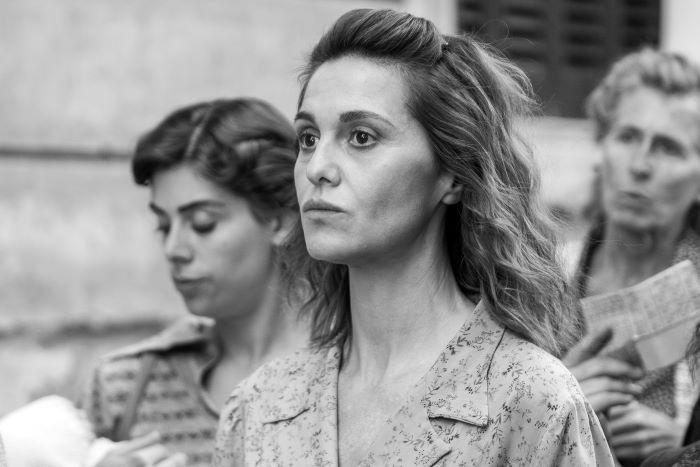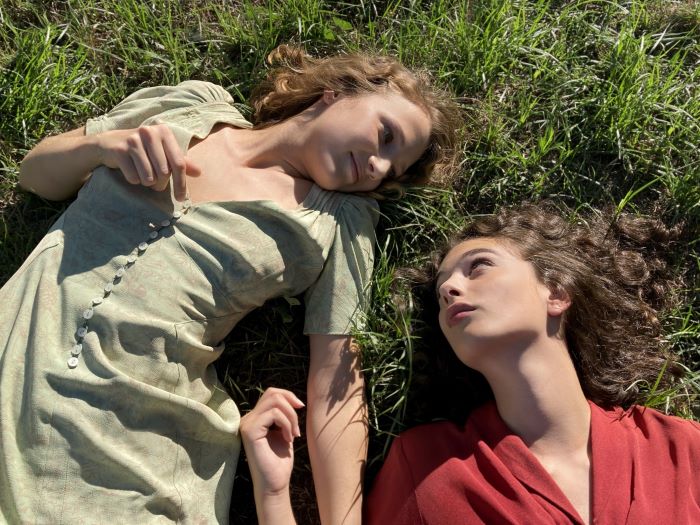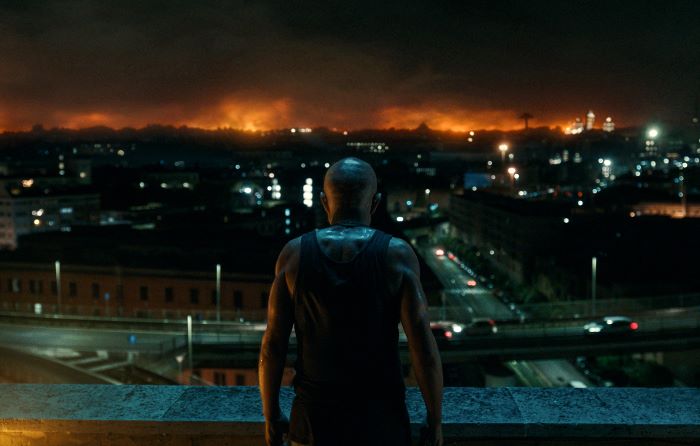At Film at Lincoln Center’s Open Roads: New Italian Cinema festival, two women directors turn in heartfelt pictures with some charm to burn, while two men deliver movies touched by a molto male malaise. Flaws aside, all have something in which to revel, whether it’s a cockeyed take on the world, sumptuous visuals, or just entertaining spates of unpredictable weirdness.
Let’s start with the hit of the bunch, actress, writer, and debut director Paola Cortellesi’s There’s Still Tomorrow. This film is a sensation and conversation piece in Italy, where it now numbers among the country’s top 10 grossing movies of all time. The story of a woman transcending a violent marriage can be quirky and diffuse, but like the arc of history, it bends toward justice.
Shooting in neorealist black-and-white, Cortellesi sets her story in 1946 and casts herself in the lead role of Delia, who is married to a loutish, nasty man who starts the day beating her and belittles her constantly. Delia has to work multiple jobs, care for two rambunctious little boys, and help steer her socially disadvantaged daughter through the marriage market. There’s also an unpleasant father-in-law to deal with and a couple of men offering up the wrong kind of attention.
Far from bemoaning her heroine’s fate, Cortellesi endows Delia with integrity, grit, and a needed dose of cunning. Loopy, bravura comedic interludes and blasts of pop music lighten what could be a woebegone mood. Acts of sass and rebellion carry Delia through tight spots, and community and connections with others give her the strength to negotiate potentially humiliating situations. There’s Still Tomorrow ends on a surprising socially conscious note, adding a steely yet poignant touch to the movie’s worldly go-rounds. It’s a bit long and meandering, but this film is singular and special—a winner that deserves its success.
Directed by Laura Luchetti, The Beautiful Summer is as tender as Tomorrow is bumptious. Gentle seamstress Ginia leads a tame life in 1930s Turin sharing an apartment with her brother, until she is suddenly drawn to a wild, racy young artist’s model (Deva Cassel, striking daughter of Euro stars Vincent Cassel and Monica Bellucci). The two strike up a friendship and before you know it, Ginia finds herself swept up in a fast bohemian social set against the warnings of friends and brother. Seductive painters turn out to be horny cads. Late nights endanger her promising career as a budding clothing designer. Ginia will have to make some major mistakes in order to find her own way.
The Beautiful Summer is not groundbreaking, but moving nonetheless. It makes you care about its impressionable young heroine, who longs not only to be painted and caressed but to be seen: “I want someone to look at me and tell me who I am.” The movie is also unexpectedly frank about the disappointment of keenly anticipated but underwhelming (and potentially dangerous) sexual encounters. It even throws in a little implied semi-lesbian passion into the mix. Lead actress Yile Yara Vianello is perfectly cast and looks radiant, beautifully shot in greens and golds as if in some eternally dappled magic hour.
Why do Italian male directors so frequently shoehorn silly Babylon–style parties into their movies? Two new films in the series feature chortling seminude bacchanals, as have well-known works like Loro. In the case of Stefano Sollima’s neo-noir cop thriller Adagio, it’s one of several semi-heavy-handed attempts at creating an atmosphere of decadence and moral rot—a self-conscious ambience that, along with a slow pace and convoluted plot, drags Adagio’s momentum down.
Rome is literally burning, threatened by clouds of nearby black smoke. Violent shakedowns take place in scummy apartments. Blackouts plunge banal conversations into darkness. The screen itself seems covered by an impasto of grease. Likewise, the crooked characters have a used, grimy feel, with retro nicknames like Daytona and Pol Niúman. Everything feels rather mannered and very, very serious.
At the center of multiple overlapping criminal characters with past associations, a young, jumpy, and not quite compelling young man (Gianmarco Franchini) is on the run, careening through Rome on his motor scooter. His father (Toni Servillo) may have Alzheimer’s disease or may be faking memory loss to avoid a mob reckoning. A crooked cop with a grudge against the dad wants the youngster to blackmail a politician. And another retired thug called the Camel (the usually dashing Pierfrancesco Favino, here bald, wormlike, and almost unrecognizable) seeks to protect the boy from evildoers.
It’s hard to distinguish the different movers and shakers and to figure out what their relationships are. A few nifty set pieces pick up the pace here and there, but there isn’t much action, and by the time a shootout takes place at Rome’s Termini Station, some viewers may feel the movie’s been a little too deep into brooding far niente without a dolce payoff. Worldly New Yorkers might well also bristle at a “scandal” at the heart of the action that is not really a scandal at all except in weirdly homophobic Italy. A derisive review on Letterboxd.com snorts, “Tutta questa storia per un pompino.” Look it up.
Pietro Castellito’s Enea is a sort of Less Than Zero footnote chronicling the aimless comings and useless goings of a scion of Italy’s one percent idle rich. It’s got chic interiors, drug dealing as a form of sexy slumming, unhinged fights, deathly violence that seems to come out of nowhere, and, of course, the aforementioned mandatory naughty party. Homosexuality is again treated as a taboo and scary subject. On the plus side, the film shows off some gorgeous aerial shots and décor. It also boasts star and director Castellito, son of actor Sergio, who looks like a cross between the young Andy Garcia and current hottie Jeremy Allen White. His film’s casual craziness, plus plenty of sweet eye candy, will satisfy a certain kind of jaded, thrill-seeking filmgoer.









Leave A Comment